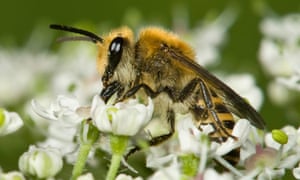Pesticide manufacturers, Bayer and Syngenta were involved in a meeting over whether to lift a ban on neonicotinoids in the UK, previously suppressed minutes reveal

The manufacturers of controversial pesticides took part in a key meeting on whether a Europe-wide ban on their chemicals should be lifted in the UK, according to newly published documents. The record of the meeting of the UK government’s expert committee on pesticides (ECP) had previously been suppressed.
Neonicotinoids, the world’s most widely used insecticide, have been linked to serious harm in bees, including a drastic reduction in queens, and were banned across the EU in 2013. Bees and other pollinators are essential for many crops but are in decline due to the impact of pesticides, loss of habitat and disease.
The NFU initially applied for the ban to be lifted in 79% of all oil seed rape fields, about half a million hectares. But the ECP concluded that “the application was not well evidenced, with weaknesses/uncertainty in referenced data/studies”.
The ECP routinely publishes records of its meeting within three weeks, but on this occasion it was gagged by the Department of Environment, Food and Rural Affairs, who told the ECP it wanted to prevent campaigners lobbying ministers on the issue. The meeting record was only published after a second NFU application, to suspend the neonicotinoid ban for only 5% of oil seed rape fields, was successful.
In another development, Friends of the Earth (FoE) took the first legal step on Tuesday to challenging the ban, which it says appears unlawful. FoE has written a judicial review pre-action letter to environment secretary, Liz Truss, who is the prospective defendant. FoE say that the government failed to supply information it requested on the criteria and process used to suspend the neonicotinoids ban.
“The huge public interest in bee decline and pesticide use contrasts with the government’s excessive secrecy and handling of this decision to let bee-harming pesticides back into our fields this autumn,” said Friends of the Earth’s Paul De Zylva. “Ministers pledged their decisions would be based on science but it has been hard obtaining information, including about the scientific basis, despite repeat requests.”
The record of the 20 May meeting shows Bayer and Syngenta representatives arguing that “79% of the oilseed rape crop was under threat or severe risk from cabbage stem flea beetle and aphids”. The chemical companies also said “the most recent data indicated that 5% of the national crop was lost (or required reseeding or replacement with an alternative crop), compared to 1-1.5% losses in previous years”.

